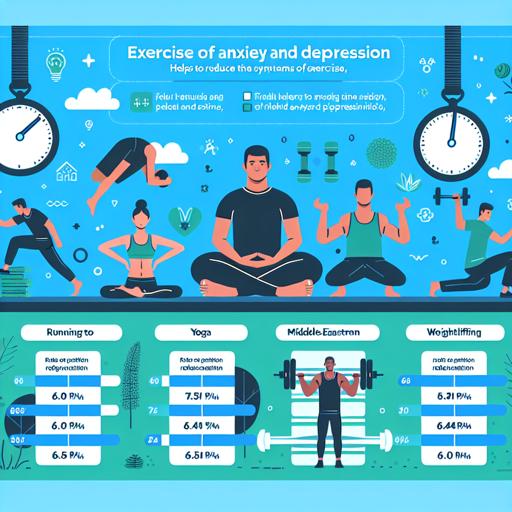In today’s fast-paced world, maintaining mental well-being is more important than ever. One of the most effective ways to nurture your mind is through regular physical activity. The psychological benefits of regular exercise are profound, offering more than just physical health improvements.
Engaging in consistent exercise routines can alleviate symptoms of anxiety and depression, enhance mood, and boost overall cognitive function. By understanding the connection between physical activity and mental health, individuals can harness the power of exercise to improve their quality of life.
This blog delves into the myriad ways exercise can transform your mental landscape for the better.
Understanding the connection between physical activity and mental health

The playground of the mind operates in fascinating ways, much like a maestro orchestrating a symphony where each note affects the ensemble performance. The role of regular exercise in this captivating concert is akin to that of the conductor. It stands at the center of the stage, guiding with subtle yet profound gestures, harmonizing physical vigor with mental serenity.
As the heart quickens and endorphins launch into jubilant rhythms, the resulting effect is both subtle and powerful. Exercise, often mistaken as merely a tool for sculpting biceps and tightening waistlines, unveils a more profound impact—the enhancement of psychological wellbeing.
This influence on the psyche is the hidden ace that many, ensnared in the drudgery of daily life, often overlook. Immersing oneself in the routine of physical activity—whether it be the primal beat of a morning jog, the rhythmic power of a yoga flow, or the competitive edge of a racquet battle—initiates a cascade of changes that infiltrate the mind with formidable benevolence. Let us consider, for instance, the formidable duel against stress.
In this arena, exercise emerges as a reliable ally, going into battle armed with the arsenal of endorphins, the „feel-good” chemicals that surge through the brain, combatting cortisol levels and bathing the mental landscape in tranquility. With each deliberate movement, anxiety reduces to a whisper, stress cowers in the wings, and the harsh cacophony of everyday concerns gently dissolves into a serene background score.
Furthermore, the consistent engagement in a physical routine can act as a craftsperson, deftly chiseling away at the cumbersome stone of depressive moods or a flat spirit, revealing a more resilient form of emotional resilience. This transformative process is much akin to polishing a diamond—incremental yet undeniably enlightening.
The regularity of movement provides a framework that empowers individuals, increasing self-esteem as physical changes translate into mental fortitude. Depression, standing despondently on the sidelines, watches as individuals, buoyed by the effects of hard-earned sweat, take huge strides forward, proving that the psychological benefits of exercise are neither abstract nor ephemeral. Bridging the gap between physical activity and mental health, regular exercise stands as an enduring testament to the strength and interconnectedness of body and mind, weaving a tapestry where each step, each push, and every ounce of effort contributes to a more harmonious existence.
How exercise reduces symptoms of anxiety and depression

Imagine a world where jogging around the block could feel as refreshing as a power nap and as restorative as a heartfelt laugh. That’s the captivating allure of the psychological benefits that come with regular exercise.
When it comes to banishing the pesky clouds of anxiety and depression, engaging in physical activity can be as potent as a pep talk from your very own cheerleader. The magic lies in the brain’s chemistry; exercise prompts the release of endorphins, those delightful neurochemicals that act as natural painkillers and mood elevators. Think of them as your brain’s way of giving you a gentle high-five after every session of sweat and strain.
On a deeper level, exercise fosters neuroplasticity and bolsters the growth of new neural connections, painting a hopeful skyline over the previously overcast mental landscape. Now, let’s take a meandering stroll down the path of daily life, where stress often lurks around every corner like an unwelcome surprise party.
Here, regular exercise steps in as your trusty sidekick, ready to swing its stress-busting hammer with finesse. Directing your focus away from life’s overwhelming demands and instead channeling it through physical activity can transform your mindset from survival mode to thrive mode. As we pound the pavement or hit the yoga mat, our minds undergo a fascinating shift.
Exercise cultivates mental resilience, a sturdy armor that can deflect negative thoughts. For those battling the shadows of anxiety and depression, regular workouts serve as consistent reminders of personal strength and achievement, reinforcing a sense of control over one’s life.
The longevity of these psychological gifts lies in the consistency of practice. Regular physical activity is much more than a fleeting antidote; it’s a mindset transformation that incrementally refashions the architecture of mental health. Our bodies are built for movement, and our brains flourish when we embrace this intrinsic design.
By integrating exercise into daily routines as mindfully as we savor our morning coffee, we not only nurture our physical selves but also cultivate a robust shield of mental fortitude. And so, lacing up those sneakers doesn’t just prop one on the path to fitness; it also embarks the mind on a relentless journey toward clearer skies and brighter horizons.
The role of exercise in enhancing cognitive function and memory

In the bustling theater of life, where mental agility often takes center stage, regular exercise might just be the unsung hero waiting in the wings. While it’s no secret that physical activity can sculpt your abs and shrink your waistline, the real magic unfolds in the mind.
Engaging in consistent physical activity is like gifting your brain a gym membership and a standing ovation all at once. Research consistently highlights the psychological benefits of such activities, pointing to an impressive boost in cognitive function and memory. Imagine exercise as a gardener, diligently tending to your neural garden, nurturing the growth of synapses, and assisting in the formation of new neural connections that enhance mental clarity and creativity.
Now, picture your brain as a symphony orchestra. Each neuron, an individual musician striving for harmonious synchrony, can sometimes fall out of tune.
Enter exercise, the maestro, orchestrating a masterful performance through increased blood flow, enhanced oxygen supply, and the release of neurochemicals that reduce stress and improve mood. This neurochemical cascade acts as a natural antidepressant, fostering a mental environment ripe for learning and memory consolidation. Just as tuning an instrument allows for clearer melodies, regular sweat sessions shoo away the cognitive cobwebs, sharpening focus and allowing memory to flourish.
In a world overflowing with distractions, where attention is a rare currency, regular physical activity emerges as a powerful ally. By improving the health of the hippocampus, the brain region pivotal for learning and memory, consistent exercise paves the way for greater cognitive resilience.
Every jog, swim, or pilates class translates into a neural investment, promising dividends in the form of improved mental health and enhanced information retention. In essence, exercise becomes both the anchor and sail, grounding the mind while propelling it forward, allowing you to navigate life with the finesse of a well-seasoned sailor on tranquil seas. Embrace the power of movement and let your cognitive faculties set sail toward the horizon of endless mental possibilities.
Boosting self-esteem and confidence through regular physical activity
It’s a little-known secret that gym memberships come with a hefty side of self-esteem. Forget the scales and the mirror’s harsh glare—let’s talk about the inner glow that radiates when you lunge, lift, or simply stroll your way to better mental health. Regular physical activity is the unsung hero of emotional resilience, playing a starring role in boosting the mind’s most valued currency: confidence.
As you lace up your sneakers and unroll your yoga mat, you’re also kickstarting a complex symphony of psychological benefits, an ensemble where endorphins harmonize, stress takes a backseat, and anxiety hits the snooze button. Exercise has this magical ability to clear the fog, sharpen focus, and wrap you in a warm blanket of accomplishment, polishing your self-esteem until it sparkles as brightly as a diamond in the sun.
Consider the tale of a casual jogger-turned-marathoner. Every mile conquered is not just a physical achievement but a mental medal of honor, an affirmation that they are capable, strong, and utterly in control.
This isn’t just feel-good fluff; there’s a solid scientific backbone to these claims. Engaging in regular exercise increases the production of neurotransmitters like dopamine and serotonin—nature’s prime mood elevators. They chart a steady course through your brain, lifting spirits and smoothing out the rocky road of self-doubt.
You start to realize that if you can train your body to go the distance, even on those cold, rainy mornings when the bed is calling, you can also conquer other daunting hills outside the fitness realm. Additionally, exercise classes can turn into social hubs, unifying individuals under the banner of sweat and shared goals, fostering a sense of community that reinforces confidence. Whether it’s a boot camp buddy high-fiving you after the final plank or yoga classmates commiserating post-downward dog, these interactions cultivate a network of support that makes you feel valued and seen.
As your muscles strengthen, so too does your resolve, each push-up a reminder that you possess both the power and the perseverance to excel. While your body reaps the physical rewards, your mind weaves a powerful narrative about strength and self-worth, a rather delightful two-for-one deal.
Regular exercise is an exhilarating ride, and its destination—your well-being—is undeniably worth the plan and the effort.
The impact of exercise on stress management and emotional resilience
In the bustling chaos of our modern world, where each day can feel like an episode in a never-ending drama, regular exercise might just be the unsung hero of emotional stamina. Imagine stress as the pesky antagonist, always lurking in the shadows, waiting to leap out when you least expect it.
Enter exercise, stage right, ready to arm you with the psychological benefits that transform you into a more formidable protagonist. Engaging in consistent physical activity does more than tone your abs or biceps; it forges a sturdy shield of emotional resilience, helping you parry life’s inevitable jabs with grace and aplomb. When you engage in regular exercise, you essentially engage in a conversation with your body, one where endorphins play the role of the charming conversationalist, effortlessly lifting the mood and paving the path for effective stress management.
The impact goes beyond mere mood boosts; it shapes how you react to stressors, honing your emotional strength and response mechanism. Picture your central nervous system as a symphony orchestra, with exercise acting as the seasoned conductor, ensuring every note is in harmony, tuning down the anxiety-invoked crescendos, and enhancing the tranquility-laden adagios.
Envision the trials of daily life akin to an unpredictable storm. Regular workouts become the sturdy vessel that not only weathers the storm but transforms it into a gentle breeze. With every session, you are training, not just your muscles, but your mind—cultivating a robust mental framework that can assess, adapt, and flourish, no matter the tempest at hand.
It’s a dance of biology and psychology, where sweating it out isn’t just physical exertion but a steady investment into a vault of psychological wealth—a vault that fortifies emotional resilience, enables masterful stress management, and ensures you’re unyieldingly anchored amid life’s turbulent tides.
Nasza rekomendacja wideo
Podsumowanie
In summary, regular exercise offers significant psychological benefits, including reduced anxiety and depression, improved mood, and enhanced cognitive function. It boosts self-esteem and provides a sense of accomplishment, while also serving as an effective stress-relief tool. Incorporating physical activity into your routine can lead to a healthier, happier mind, contributing to overall well-being and life satisfaction.
Najczęściej zadawane pytania
How does regular exercise impact mental health and emotional well-being?
Regular exercise boosts mental health and emotional well-being by reducing stress, anxiety, and depression while enhancing mood, self-esteem, and cognitive function.
What are the specific psychological benefits of engaging in physical activity?
Engaging in physical activity can enhance mood, reduce symptoms of anxiety and depression, boost self-esteem, and improve cognitive function.
How can exercise help in reducing symptoms of anxiety and depression?
Exercise can help reduce symptoms of anxiety and depression by releasing endorphins, improving mood, and reducing stress levels.
What role does exercise play in enhancing cognitive function and memory?
Exercise enhances cognitive function and memory by increasing blood flow to the brain, promoting neurogenesis, and improving synaptic plasticity, which supports better learning and memory retention.
How does regular physical activity contribute to stress management and resilience?
Regular physical activity helps manage stress and build resilience by releasing endorphins, reducing cortisol levels, and improving mood and sleep quality.
Can exercise improve self-esteem and body image, and if so, how?
Yes, exercise can improve self-esteem and body image by enhancing physical fitness, releasing endorphins that boost mood, and fostering a sense of accomplishment and body appreciation.
